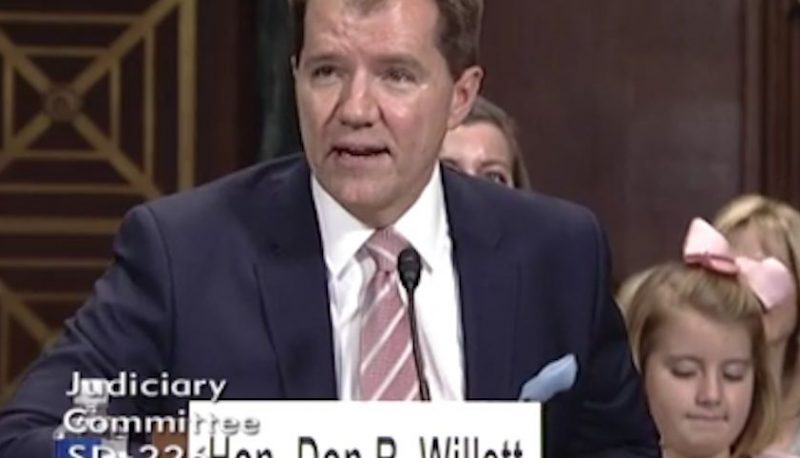“Confirmed Judges, Confirmed Fears” is a blog series documenting the harmful impact of President Trump’s judges on Americans’ rights and liberties. Cases in the series can be found by issue and by judge at this link.
In October 2020, Trump Fifth Circuit judge Don Willett tried to uphold a Texas law that required people to undergo an additional and medically unnecessary procedure before obtaining a common method of abortion used after the first 15 weeks of pregnancy. The court majority rejected his reasoning and struck the law down in Whole Woman’s Health v. Paxton.
In 2017, Texas enacted Senate Bill 8 (“SB8”), which requires that before obtaining a dilation and evacuation (D&E) abortion, a person must undergo what the court recognized as an “invasive” and unnecessary procedure to “bring about fetal demise” before the D&E procedure is performed. Before the law could take effect, a number of abortion providers challenged SB8, contending that it placed an “undue burden on a woman seeking a previability abortion.”
After a five-day trial in which testimony came from 19 witnesses, including experts from both sides, a district court judge struck the law down. Texas appealed to the Fifth Circuit, which also rejected the state’s arguments. The panel majority explained that the procedures pushed by Texas are “dangerous, painful, invasive, and potentially experimental,” yet offer no corresponding health benefit to anyone having an abortion. Also, by effectively requiring a second trip to the clinic, the law created an additional barrier especially for low-income people. The panel agreed with the lower court that “these burdens are substantial, exceed any minimal benefits from the law, and thus are undue.” In analyzing the actual benefits to determine if the burden is “undue,” all these judges were following precedent: the 2016 Supreme Court case Whole Woman’s Health v. Hellerstedt, which had been decided with a five-justice majority.
In his dissent, Judge Willett declared himself no longer bound by that case, acting as if it had been overturned by the Court in its 2020 June Medical case. In June Medical, a four-justice plurality applied Whole Woman’s Health and struck down a Louisiana law identical to the Texas law struck down in that earlier case. The reason there were only four justices rather than five was because President Trump had replaced Anthony Kennedy—part of the Whole Woman’s Health majority in 2016—with Brett Kavanaugh. So only four justices remained on the Court to endorse the reasoning of Whole Woman’s Health: Justices Ginsburg, Breyer, Kagan, and Sotomayor. Chief Justice Roberts—who had dissented in the earlier case—provided the fifth vote to strike down the Louisiana law, but only on the basis of stare decisis. Yet Willett took it upon himself to declare Whole Woman’s Health overruled and decided that June Medical’s binding majority holding could be found where the chief justice’s concurring opinion agreed with the four dissenters.
The panel majority explained why Willett’s approach was invalid. The Supreme Court has repeatedly warned circuit court judges that only it can overrule its own precedents. Moreover, when there is a plurality decision, lower courts often follow the position taken by the justices who concurred in the judgment on the narrowest grounds. In this case, five justices agreed that Whole Woman’s Health remains binding precedent. In addition, the Supreme Court itself has made clear when there is a plurality, “the views of dissenting Justices are irrelevant to determining the holding of the Court” because they did not contribute in any way to the Court’s judgment.
Willett’s approach was similar to what he and the other Trump judges on the circuit did in 2019 when June Medical was before the Fifth Circuit, before reaching the Supreme Court. In order to avoid applying Whole Woman’s Health v. Hellerstedt, they simply made up new “facts” contradicted by the record in order to differentiate the two cases and reach their foreordained conclusion. This time, he made up a new Supreme Court holding that let him ignore the actual Supreme Court case he had a professional responsibility to apply. Fortunately, for now at least, the majority rejected his view and upheld the right to choose.

